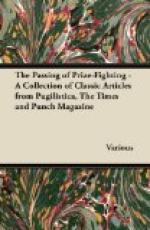[Illustration: Fancy Picture of Hanwellian Admirer of the Ibsenesque Drama thoroughly enjoying himself.]
I have not the original for reference handy, but the version played at Terry’s Theatre bears internal evidence of a close translation. An adapter, I fancy, with a free hand would scarcely have made one of the characters use the same exit speech on two occasions. Nils Krogstad does this. He can think of nothing better than, “If I am flung into the gutter, you shall accompany me,” repeated twice with the slight variation, “If I am flung into the gutter for the second time, you shall accompany me,” used for the last exit. Again, Torvald Helmer has a long monologue in the final Act that a practised playwright would have “broken up” with the assistance of a portrait, or a letter, or something. From this it would appear that the Editor, WILLIAM ARCHER (without the “Mr.”) has very faithfully produced the exact translation of the original. To be hypercritical, I might suggest that perhaps occasionally the version is rather too literal. For instance, Torvald Helmer, although he is cursed with one of the most offensive wives known to creation, would scarcely call her “a little lark,” which conveys the impression that he is a “gay dog,” and one given to the traditional ways of that species of ultra-sociable animals. I have confessed I have not the original before me, so I cannot say whether the title used by IBSEN is “Smalle Larke,” but I fancy that a “capering capercailzie,” if not actually his words, would be nearer his meaning. A capercailzie is, according to the dictionaries, a bird of “a delicious flavour” and partially “green;” it is also found in Norway “very fine and large,” as IBSEN might say. Surely Torvald would have thus described his semi-verdant Nora, finding her distinctly to his taste.




